EDITOR’S NOTE — The sight of Angel Cabrera will turn heads on the grounds at Augusta National this week. The 2009 Masters champion hasn’t been here since 2019 and never has a player of supreme accomplishment been associated with such abhorrent activity. After spending two-and-a-half years in prison for domestic abuse, to what degree will fans offer a second chance? Boxers have successfully resumed careers after incarceration for crimes against women, and football and basketball have seen multiple players arrested for violence, but golf’s arena has traditionally kept a higher standard. Being a pro golfer comes with a special veneer of respectability that’s evaluated stringently at the Masters.
Last year, Augusta National Chairman Fred Ridley said the club would welcome “one of our great champions” back if Cabrera resolved the visa issues stemming from his conviction on abuse charges from former girlfriends. The visa is now sorted, and over the weekend Cabrera, 55, won for the first time in more than a decade, capturing the PGA Tour Champions’ James Hardie Pro Football Hall of Fame Invitational in Boca Raton, Fla.
With all this back in the fore, we are republishing the Golf Digest interview with Cabrera from shortly after his prison release in 2023 when we assigned investigative journalist and award-winning author Luis Fernando Llosa to travel to Cordoba, Argentina. It was Llosa’s second trip to Cabrera’s home, as he followed Cabrera there after his one-stroke U.S. Open victory over Tiger Woods and Jim Furyk at Oakmont in 2007 and discovered a man irrevocably shaped by his parents’ abandonment, impoverished childhood and sixth-grade education. Such facts should not elicit sympathy but do inform a life that returned as if by gravity to the lowest of circumstances.
In all, Cabrera served 30 months in three jails in two countries for both “causing minor injuries” and “intimidation in a gender-violence context.” Cabrera has apologized to his former partners in the courtroom and privately paid significant settlements to forestall civil suits. If or to what degree these women accept his apology, we do not know. Micaela Escudero, whose relationship with Cabrera was briefest, declined comment to Golf Digest in 2023 through her lawyer, Federico Pizzicari Bordoy. “As far as she is concerned, that stage of her life is over,” Pizzicari relayed.
Golf Digest also reached out to Cecilia Torres Mana at that time. Although she did not respond, she did publish an essay in 2021 on the first-person news website Orato. “What started as a normal relationship quickly turned into physical and psychological submission,” she wrote, stating she was sexually abused, hit and locked in a closet.
Cabrera continues to deny many of the more heinous details in the convictions against him. A careful reading of his cases paints a picture of an emotionally disabled alcoholic. To be sure, he is guilty of terrorizing two women, was found guilty and admits it.
The primary purpose of the following interview, translated from Spanish, was not to relitigate details but to know the experience of a once celebrated champion who went to prison. Judge the veracity of his contrition for yourself.—MAX ADLER
Why were you in prison? I was in jail because I went through a very bad time in my life in which I made many mistakes.

Photo by Irina Werning
Are you guilty? That’s the way the judge saw it, and I believe so, too. What she determined was correct.
Specifically, what are you most sorry for? The lowest moment I can recall is throwing a cellphone at my partner’s head. Although I deeply regret all of my wrongdoings and harming the people I care for the most, I can’t rewind time and make amends. [Editor’s note: Cabrera underwent medical treatment to combat alcohol addiction, including daily pills that cause sickness if alcohol is ingested. He said he intends to stay sober for the rest of his life.]
At the beginning of your prison sentence, you were defiant. Did you really believe that the women that you were convicted of assaulting were at fault for what happened? I wasn’t in a very good mental state then. I thought I had been unjustly detained and didn’t deserve to be imprisoned. I blamed everyone else for what was happening to me. I believed that the women I’d harmed were to blame, that they had harmed me.
How do you feel now? I am repentant and embarrassed. I made serious mistakes. I refused to listen to anyone and did what I wanted, how I wanted and when I wanted. That was wrong. I ask Micaela for forgiveness. I ask Celia for forgiveness. They had the bad luck of crossing paths with me when I was at my worst. I wasn’t the devil, but I did bad things. I’ve apologized to them both in court, and I do so again now. I am deeply embarrassed because I disappointed the people closest to me—and everyone who loves me through golf. Golf gave me everything, and I know I will never be able to repay the debt I owe this sport.
When did you begin your mandated prison therapy? [After his arrest in Brazil in January 2021, Cabrera was interred in Placido de Sa Carvalho prison in Brazil for five months, then transferred to Carcel de Bouwer in Argentina.] When I got to Bouwer, I had a session every 15 to 20 days for the entire time I was there. At first, I was closed and blocked. I believed everyone else was at fault for everything that had happened. I blamed my manager, my lawyer, the press, my kids, all my friends. I felt they hadn’t taken care of me properly, but that wasn’t true. They tried. Manuel would tell me, “You are doing bad things,” and I’d say, “Yes, yes, yes. I know.” But 10 minutes later I’d be at a bar drinking another beer. I was in my own world. I listened to no one.
Over time, I realized that I was the guilty one. The psychologist succeeded in getting the best out of me. In the first session she asked me, “How are you?” “How do you think I am? I’m terrible. I’m in prison.” So she sent me back to the main hall. The same thing happened the second time. “How do you think I am? I’m imprisoned!” I told her. But she kept insisting. Soon I began to realize that I was not well because everything I’d done had led me here.
When did things start to go wrong? I would say 2012. I struggled to compete with the younger players on the PGA Tour, and a nagging shoulder injury made it difficult for me to play the way I wanted to. When I realized I couldn’t win, I started to lose interest. I was OK while I was competing, but whenever I returned to Cordoba, my life would unravel, and I’d end up hanging out in the wrong places with the wrong people. I started to separate myself from the good folks I’d met in the golf world. As I surrounded myself with unsavory types, things got worse until it was me and nobody else. If you weren’t useful to me, it was over. Ciao. I’d become so full of myself. I didn’t have to go in that direction, but I did. That’s why I feel so bad. I did all this to myself. But it’s done. I can’t erase how I acted. All I can do is move forward and do something different.
More Masters preview stories 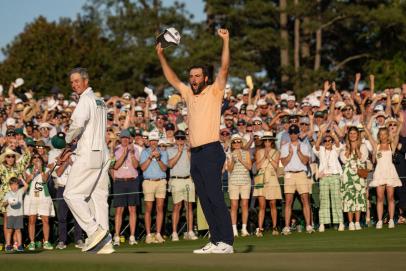 FAQ Masters 101: Answering the most frequently asked questions about 2025’s first major
FAQ Masters 101: Answering the most frequently asked questions about 2025’s first major 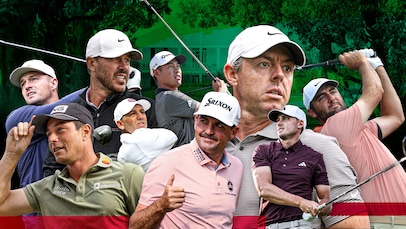 Masters Preview Masters 2025: Power rankings for the entire field at Augusta National
Masters Preview Masters 2025: Power rankings for the entire field at Augusta National 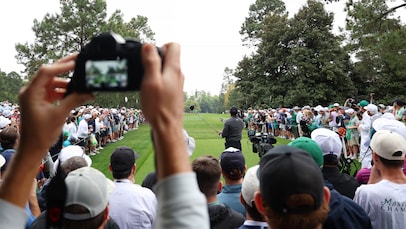 viewer’s guide How to watch the 2025 Masters (with extra weekend coverage!)
viewer’s guide How to watch the 2025 Masters (with extra weekend coverage!)
[Before winning on the PGA Tour Champions in 2025, in Cabrera’s last eight years on the PGA Tour he had four top-10 finishes, missing 54 cuts in 128 appearances. His two bright performances were a playoff loss to Adam Scott at the 2013 Masters and a victory at the Greenbrier Classic in 2014.]
You’ve mentioned that prison gave you a renewed sense of freedom. That’s the truth. It’s given me a new perspective. I don’t look for people to blame anymore. While I was detained, I realized that if I had still been out—and behaving the way I had been—I would probably not be alive now. There were nights when I lay in my cell thanking God for my imprisonment. What I had been doing was so crazy that I could have ended up—I can’t talk about the things I did. I can’t tell people about them because I feel so awful and am so embarrassed. If I’d called him [points to his decades long-friend and manager, Manuel Tagle] at 3 a.m. or him [points to his longtime lawyer and friend Marcelo Lozada] at 6 a.m. in the morning and told them to go buy me a case of booze, they’d have told me I was crazy and hung up on me, but the people I had around me did whatever I told them to, and that was totally unhealthy for me. I created that.
You were in three different jails. Talk about life in each. I had a really hard time in Brazil. I was stuck there for five months in a pavilion with 19 other inmates. Most were foreigners who were there for drug trafficking—Germans, Brits and Americans. I was awaiting extradition with a Chilean and another Argentinian. Ten cells, two prisoners per room, but it was pretty quiet because none of us had much contact with each other. For five months I slept on concrete with a few rags. The bad part was when they bussed us to the hospital infirmary. I was taken there every 15 days at the behest of the consulate to ensure that I was physically healthy.
Were you scared? Not on the bus because we were all tied up. The problem was later, when we got to the hospital. They would jam us in one large cage, which was nerve-wracking, but I made sure to stay at the margins, away from everyone. We were stuck there in the hot sun with nothing to eat from 8 a.m. until 10 p.m. But what can I say? I was in jail. They would lock us in our cells at 4 in the afternoon and keep us there until 9 the next morning. Me and my Paraguayan cellmate were stuck in a space that was about three yards long and three yards wide. At 8:30 in the morning they’d bring us coffee and a little piece of bread. They would let us go to the main hall at 9, then they would lock us back up at noon. For the first 10 to 15 days, I didn’t worry too much. I figured I’d be there for less than a month and then get sent to Argentina, but after a month passed, I was still stuck in Brazil, and I started to get worried. I stopped eating and became depressed. I pleaded to be sent to Argentina. You know, when you’re like that, a lot of bad thoughts get stuck in your head. I thought, I’ll never get out of here alive. I’m going to die thrown down this well. I’m never going to see my family, my people again. I’ll never return to my country.
What was your experience in Bouwer? I arrived on June 12 and spent 18 days in quarantine. The cell block I was placed in is known as one of the best. Compared to all the other lockups, it was the most peaceful. There were no killers. It was mostly older inmates who had committed fraud—primarily white-collar criminals. During my last three months at Bouwer, they brought in inmates who had been jailed for murder, rape and drug-trafficking, but they had all been in prison for many years. Only inmates with excellent conduct records were mixed in with us. When they got there, things got a little more tense, but I kept to myself. I never got into trouble with anyone while I was at Bouwer.
‘There were nights I lay in my cell thanking God for my imprisonment. What I had been doing was so crazy.’
Did the guards and prisoners know you were a famous golfer? Yes. Golf is not at all like soccer in Argentina, but they knew who I was, what I’d done and why I was in prison. For the first few days they were friendly and careful around me, but within a couple of weeks, you were just another prisoner, another number. You’re stuck there, and you have to live under the same restrictions as everyone else.
Did you have a job? When I got to Bouwer, I asked if I could do physical work and take classes. I wanted to work and finish elementary school, but they refused. “We cannot mix you in with the general population,” they told me. “Something bad could happen to you.” They were worried about having to deal with headlines and bad press if I got into trouble. I guess, in that sense, being a celebrity worked against me because there was a lot to do there. There was a bakery. There was a workshop. There were maintenance crews and even a vegetable garden. But the prison director wouldn’t let me do any of that. The only work I was assigned was cleaning the main hall once a day, which took 10 minutes. For the rest of the day, I remained there or in my cell.
What did you do all day? I read a lot. Manuel’s dad brought me eight or nine golf magazines at a time. I was alone in my cell most of the time because my cellmate worked all day. During my last six months at Bouwer, I was completely alone because he got released and no one replaced him. I thought a lot about tournaments I played in, especially when I read about myself in the magazines. The older ones had photos of me playing in the U.S. Open and the Masters, as well as in the Presidents Cup, which I played in four times. I’d get nostalgic, but it helped me pass the time. I remember nearly every stroke of that Sunday I won the Masters and would replay it in my mind: the playoff, the famous shot I made through the trees.
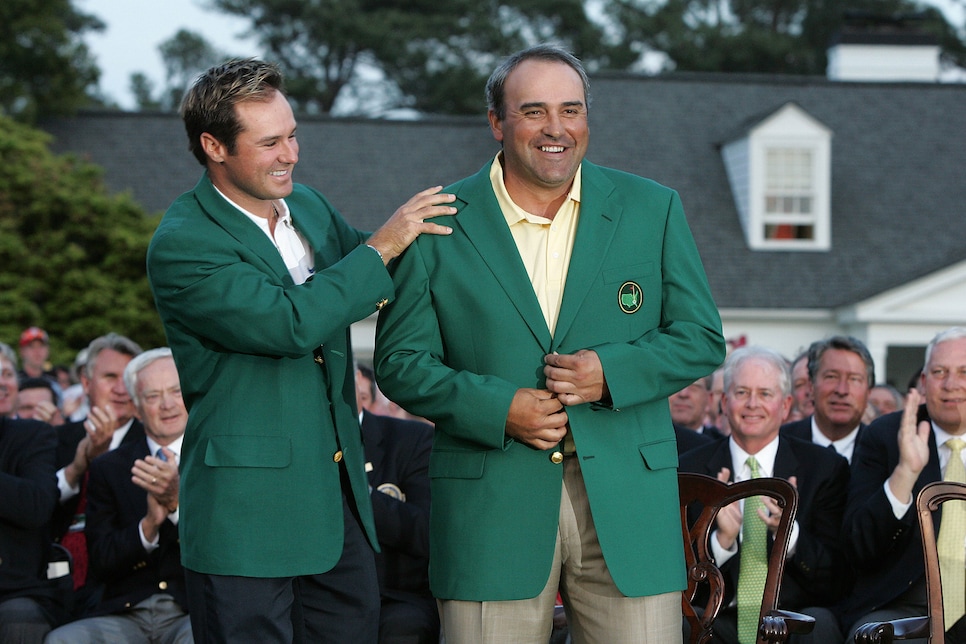
Cabrera’s victory at Augusta National in 2009 came less than two years after a win in the U.S. Open at Oakmont. He was the first South American golfer to win either title.
The State
Did you have contact with anyone from the golf world while you were in prison? Some of my old tour friends—Retief Goosen, K.J. Choi, John Daly, Pat Perez—sent me messages of support through my neighborhood friend, Cordovan caddie Angel Monguzzi. When Gary Player was in Buenos Aires, he gave Andres Schonbaum, the president of the Argentina Golf Association, a letter to pass on to me. It read, “Compadre, I will be happy to see you again. Tienes huevos grandes. You are a CHAMPION.” It gave me a big boost. I have great memories of Gary, who I became good friends with when he was my captain during the Presidents Cups of 2005 and 2007. However, the truth is that I kept to myself. I didn’t want people to see me while I was in jail. Eduardo Romero, who was an important figure in my golfing career, asked several times if he could come visit me. He had been a mentor to me since I turned professional in 1989 and a longtime companion on the European Tour. But I kept telling him, “No, just wait. I’ll be out soon. Don’t come.” The truth is that I was not well emotionally. I was anxious, and I didn’t want people to see me there. I’d say, “We’ll see each other when I get out.” Unfortunately, it was not meant to be because Romero died while I was at Bouwer. I felt the loss deeply. All I’m left with is great memories of the times I spent with him.
Who visited you in prison? My partner Yamila, my manager, Manuel Tagle, his father, Manuel Sr., my lawyer, Marcelo, my two sons, and my lifelong friend Marcelo Moroldo, who caddied for me back when I played on the Argentine tour.
Were you able to do anything remotely like golf while incarcerated? Not really. From time to time we would get to go out to a soccer field, and I’d find a stick or broom handle and take some swings, just to practice the movement. There was nothing there that I could hit.
What was your transition from Bouwer to Monte Cristo like? My last three months at Bouwer were terrible. I was exhausted and got really depressed. Nothing ever changed there, and that got to me. Monte Cristo was completely different. No one watched over you. No one controlled you. Eighty inmates shared 90 hectares of farmland. They were all there because they had attained high marks for conduct and been transferred near the end of their prison sentences. There were no bars on the windows, no locks on the doors, just nature. When I got there the director said, “See that there? That’s the door. If you want to go, leave. We aren’t going to look for you.” You could walk out at any time, but, of course, if you did, you’d end up somewhere much worse.

Angel Cabrera, photographed on Oct. 3, 2023, at El Terron Golf Club in Mendiolaza, Argentina. (Photo by Irina Werning)
What did you do at Monte Cristo? I worked in the nursery taking care of plants. I enjoyed working two and a half hours each morning, watering and sorting plants, setting the bad ones aside and picking out the bigger ones that were ready to be transplanted. It was a good job physically because I got to move around, and it kept me busy mentally. I focused my mind on taking good care of the plants. I would go to the nursery in the morning and to school in the afternoon. Unlike at Bouwer, where it was too risky to attend classes, I was able to work toward finishing sixth grade. I didn’t get to complete the year because I still had two months of school left when I was released from prison in August.
Do you plan to continue studying? No. I’m going to focus on golf.
What if not for golf? I don’t know. I’m not a fortuneteller, but golf is what presented itself. I started going to the club and caddieing when I was 9. By age 11 I’d quit school and spent all my time working at Cordoba Country Club. I was supposed to finish my sixth-grade assignments to get into seventh. Instead, I told my grandmother, “I’m never going back to school.”
More Masters preview stories .png.rend.hgtvcom.406.203.suffix/1588791770594.png) Golf Digest Logo 50 defining moments in Masters history, ranked
Golf Digest Logo 50 defining moments in Masters history, ranked  Golf Digest Logo Sundays with Butch: The real stories of six unforgettable Masters final rounds from inside the ropes
Golf Digest Logo Sundays with Butch: The real stories of six unforgettable Masters final rounds from inside the ropes 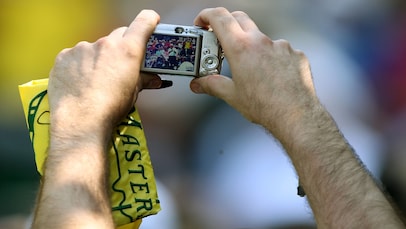 golf debate answered Debating the best Masters traditions
golf debate answered Debating the best Masters traditions
“That’s fine,” she said, “but you’re going to get up at 7 a.m. like I do and work all day and return at 6 p.m. like me.” I was happy with that. I knew there was no way I would be able to afford a university education. I’d learned to read and write and that was enough. I didn’t feel I needed anything else. I began to believe I could make a living playing the game.
In 1989, the year I turned pro, my oldest son, Federico, was born. I realized I had to figure out a way to support him and that if golf didn’t work out, I didn’t have any other good options. I’d have to live off the game one way or another, as a player, a greenkeeper or whatever. So I worked and worked and worked. Most of the guys I played with then—some of whom were better than me—didn’t make it, but I kept at it because golf was it for me.
Who picked you up the day of your release? My partner, Yamila. She was my guardian the entire time I was at Monte Cristo. She had signed me in and out the four times I’d already been out on day passes. But that day was a special day. I got home at noon. Everything seemed a bit strange and knowing that I didn’t have to go back actually made me nervous. When I’d been out on the day passes, I’d spend every last second I could at home. I’d stay as late as possible and rush back to get to prison at five minutes to 11. That night when the clock struck 10, my only thought was, Now I get to sleep in my own bed.
What was it like to be home with your new son, Felipe? [At Bouwer, well-behaved inmates were permitted two-hour visits with partners every 15 days. In November 2022, Yamila Alvarez, Cabrera’s partner of four years, gave birth to their son, Felipe. They were married in October 2023, two months after his release.] It was incredible. I spent very little time with my older children. When they were growing up, I travelled a great deal for work. I was away seven to eight months a year, so I didn’t have much contact with them. The technology back then wasn’t at all what it is now, so I couldn’t video call them. Felipe’s arrival helped me a lot, and I enjoy being with him every day. I’m able to watch him grow. The other day he started to walk. Experiencing all this makes me stronger, makes me want to get better, so I can to be there for him and help him grow and become a good person.
When did you first hit balls on a golf course? The first time I played golf was here at El Terron Golf Club in Mendiolaza, 25 days after my release. German Tagle, who is the president of the club and my manager Manuel’s brother, invited me. I’d been racked with self-doubt—wondering how well I would hit, or even if I would be able to hit the ball at all. So much time had passed. I was scared I would get frustrated—that after two or three bad hits I’d throw my clubs down in disgust and quit golf forever. For the entire drive to the club, I obsessed about how my first drive would turn out. But the truth is I hit beautifully. First, some short shots with a lob wedge on the practice range. That went well. Then a little farther with a 9-iron. Everything looked and felt good. When I hit my first few drives, they sailed 300 yards. That got me excited. To be on a golf course again after three years, to walk 18 holes again, it felt like a rebirth. Since then, my old teacher Charlie Epps has come to visit and brought me new clubs.
‘I remember nearly every stroke of that Sunday I won the Masters and would replay it in my mind.’
How are your physical capabilities? I was really worried when I got out because I lost a lot of muscle mass in prison. I had no idea how my body would respond to playing, let alone rigorous training. The only exercise I was able to do during my last seven months—at Monte Cristo—was walk the grounds. I was also concerned about my left wrist. I had it operated on in October 2020—and I had not held a golf club once since then—because I was doing rehab in Houston in November and December, and by January 2021 I was in jail in Brazil.
What about your wrist now? I still feel a little irritation, but I’m doing physiotherapy twice a week, working out at the gym three times a week and playing 18 holes several times a week.
How do you think what’s happened will affect your legacy? I made serious mistakes, but I’ve also paid my debts. I’m going to work as hard as I can to clean up my image. I want to recover the stature I had as an athlete.
Would you return to Augusta National next April? It’s my dream to return to that prestigious place and walk the course that gave me so much joy and satisfaction. I played at Augusta for almost 20 years in a row. It’s like a second home to me. It would be a great privilege to return and to attend the Champions Dinner with so many of the golf world’s greatest players.
Do you plan to make a professional comeback? I’m going to try. I thought about making a comeback the entire time I was in prison, but I got worried about how my body would respond, whether my wrist could take it or my back would hurt too much. I had no idea what I would do if things didn’t work out. I didn’t play a single round of golf for three years, but before that I played for 40. I started hitting balls with a mini-club when I was 10, and that’s something you never forget. My goal is to prepare and play on the Champions Tour. When I’m out there competing, that’s when I’ll truly know if I can handle it physically at that level. Mentally I’m already there. Golf is everything to me. It’s my life. I have to continue.
More Masters preview stories  Golf Digest Logo Masters treasures went missing, then the FBI showed up
Golf Digest Logo Masters treasures went missing, then the FBI showed up 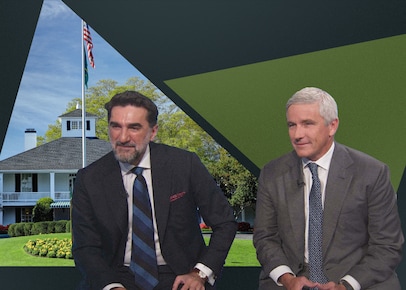 The Masters Masters 2025: Was Augusta National behind the proposed deal between the PGA Tour and Saudi Arabia?
The Masters Masters 2025: Was Augusta National behind the proposed deal between the PGA Tour and Saudi Arabia? 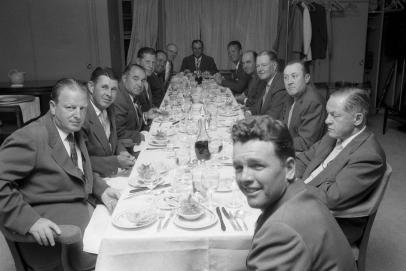 Golf Digest Logo Inside the Masters Champions Dinner, from those in the room
Golf Digest Logo Inside the Masters Champions Dinner, from those in the room
This article was originally published on golfdigest.com
